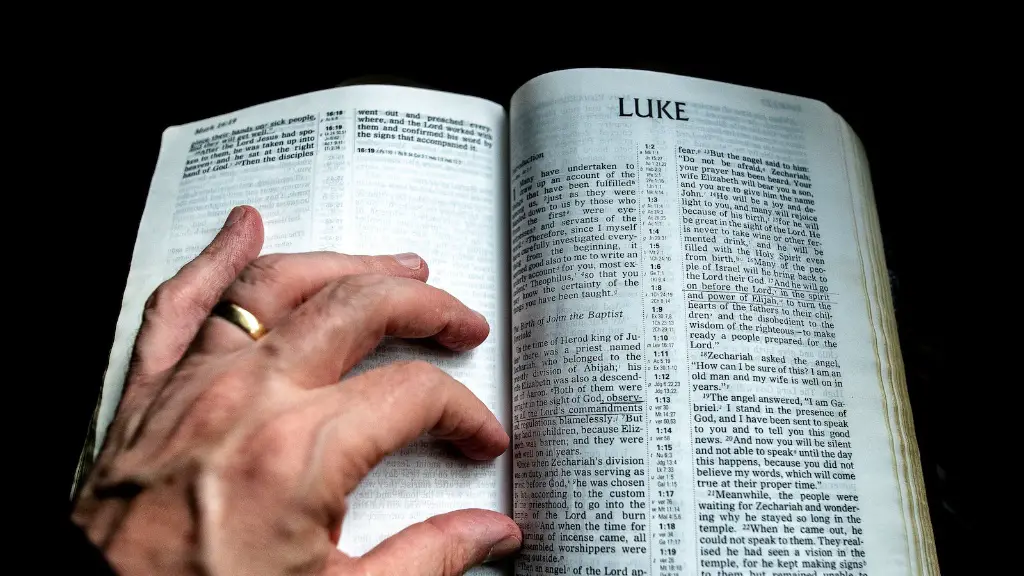Does The Bible Say Anything About Gay People?
The subject of homosexuality in relation to the Bible is one that elicits strong debate. Many people argue passionately from both sides, with some claiming the Bible follows an anti-gay stance while others take a contrary point of view. Since the Bible continues to be an essential source of guidance, it is important to look at the topic in detail to gain a better understanding.
First, an overview of the Biblical texts. In the Old Testament, homosexual behavior is addressed in some passages. Leviticus 18:22 reads, “Do not lie with a man as one lies with a woman; that is detestable”. Again in Leviticus 20:13, “If a man lies with a man as one lies with a woman, both of them have done what is detestable.” It is worth noting, however, that these codes are part of many others that are relevant mainly to ancient Israel from 3500 to 500 BC, and are no longer applicable in today’s society.
In the New Testament, there is no stated prohibition of homosexuality or same-sex unions, though Paul implies a negative evaluation in four passages in his letters to the churches of Corinth and Rome. He states,”that those who join themselves to the Lord should take up arms against their own flesh and blood” (Romans 8:13) and also speaks of “the unnatural use of one’s own body” (Romans 1:26-27).
Similar debates on the subject have been ongoing ever since the first century and remain relevant to this day. This has prompted a host of opinions from biblical scholars, theologians and other religious leaders, who, for decades, have been addressing the teachings of the Bible and refuting many of the outdated claims. While some interpret the passages to mean an absolute ban on homosexual behavior, many others have rejected this interpretation based on the fact that there is not clarity on the issue very often in the Bible.
This lack of clarity has led to much of the confusion in the present day, when people use the Bible to give their views on homosexuality. It is important to note that the Bible does not condemn homosexuality per se, but rather homosexual activity of any kind. This suggests that if a person is gay, and they live a life of celibacy or that they find a union within the same sex that is monogamous in nature, it is not seen as any form of sin.
Ultimately, the Bible may not appear to provide a clear answer on the issue of same-sex relationships but, if it is studied carefully, there is much to be learned on how to love and respect those with different views. As Justin Lee, the executive director of the Gay Christian Network, put it “What matters is not our opinion on the Bible, but how we all use the Bible to love God and our neighbors.”
Homosexuality In Religions
Religion has always played a major role in many civilizations across the world and its teachings and interpretation of scripture regarding homosexuality has changed over the years. Although many religions have for centuries strongly opposed same-sex relationships, there have been multiple movements towards accepting homosexuality with some faiths even allowing for gay marriage.
In Christianity, the debate between social conservatives and liberal reformers continues to be at the forefront of this conversation. While some religious organizations still hold the belief that homosexual practices are immoral, some churches are changing their beliefs to accept openly gay members.
The same debate also holds true in Judaism. The Reform and Conservative branches of Judaism both accept same-sex relationships, although the Orthodox Judaism still views homosexuality as a violation of Biblical injunctions. But even within that tradition, there are growing signs of acceptance, with some organizations such as Jews Offering New Alternatives to Homosexuality advocating for LGBT rights.
At the same time, Buddhism sees the concept of same-sex love as being non-problematic and openly accepts homosexuality, while Taoism recognizes the freedom of an individual to express themselves as they wish, regardless of their sexual orientation.
Islam also has a complicated history with its stance on homosexuality. While most contemporary Muslim scholars still condemn homosexuality, some interpretations from progressive interpretations of Sharia law suggest that same-sex relationships are permissible as long as no harm is done to any of the participants.
LGBT+ Rights
Due to the increasing openness and acceptance of LGBT+ individuals, a rise in support for LGBT+ rights has been seen in recent years. Although the fight for equal rights for all members of the LGBT+ community is still ongoing, we have made significant progress over the past few decades.
One example of this is that many countries around the world have passed various forms of legal protection for LGBT+ people. These range from bans on employment discrimination, to marriage equality, to the recognition of transgender people being able to use the restroom that corresponds with their gender identity.
The US Supreme Court also recently made a major ruling in favour of LGBT+ rights in 2020, when it ruled that the firing of a gay person for their sexual orientation was unconstitutional and violated a person’s right to protection under Title VII of the Civil Rights Act of 1964. This was seen as a major victory for LGBT+ rights.
In addition to the legislative advances, many organizations and communities have been created to serve the needs of LGBT+ individuals. These include support groups, health organizations, legal aid and advocacy groups, as well as various media channels such as podcasts and blogs.
LGBT+ visibility and acceptance is also increasing within popular culture. Film, television, literature and music now feature ample LGBT+ representation, with award-winning films such as “Call Me by Your Name” and television series such as “Pose” championing this visibility.
Political Opinion
Although LGBT+ rights have been gaining ground, some politicians still stand firm with their conservative views on the matter. US President Donald Trump, for example, has been criticised for his stance on the issue, with much criticism focused on Trump’s decision to withdraw Federal protections for transgender students. His administration has also moved to restrict the civil rights of LGBT+ individuals in ways such as denying same-sex couples the ability to sponsor their immigrant partners for permanent residency.
Brazil’s conservative president, Jair Bolsonaro, has also been vocal in his opposition to LGBT+ rights. He has made statements such as “If I see two men kissing in the street, I will beat them”, and has consistently sided with religious conservatives on LGBT+ issues in the courts. His rhetoric has been largely condemned by both domestic and international groups.
Even within countries that support gay rights, there are still issues within the LGBT+ community. In the UK, hate crimes against LGBT+ people rose by a staggering 144% from 2014 to 2019, with those of transgender individuals increasing by nearly 200% over this same period. Until the persistent problem of discrimination and prejudice towards LGBT+ individuals is properly addressed, true equality will not be achieved.
Health Implications
As more and more LGBT+ people come out, it is important that we take into consideration the staggering health inequalities that exist within the community. In the United States, for example, gay and bisexual men are over 44% more likely to suffer from depression, anxiety, and substance abuse disorders than their heterosexual counterparts; and transgender people are over 4 times more likely to attempt suicide.
LGBT+ people also suffer from poorer health outcomes than heterosexuals, with lesbian and bisexual women in particular having higher rates of breast cancer, cervical cancer and higher incidence of osteoporosis. Furthermore, they are more prone to health risks such as HIV/AIDS and sexually transmitted diseases.
These numbers highlight the importance of LGBT+ healthcare being openly discussed and addressed. One way this can be achieved is through raising public health awareness campaigns of the health risks associated with the LGBT+ community in order to reduce discrimination and create a more inclusive environment for LGBT+ people.
Another integral part of keeping LGBT+ individuals healthy is providing access to safe, culturally competent health services. A recent study showed that more than 25% of LGBT+ people reported that they had avoided seeking healthcare due to potential discrimination, highlighting the need for LGBT+ specific health services.
Conclusion
The LGBT+ community should have equal rights and receive the same respect as everyone else. Many countries have taken great strides to improve the lives of LGBT+ people, but there is still much work to be done in order to address the issues faced by members of the community. The struggle to ensure LGBT+ rights is an ongoing battle, but one that we must continue to fight in order to ensure that members of this community can live without fear of discrimination or persecution.





